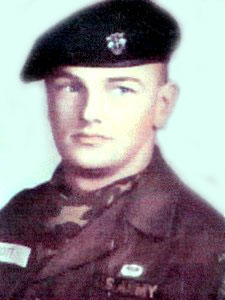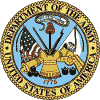| |
|
|
|
Russell Peter Bott
Master Sergeant
DET B-52 (PROJECT DELTA), 5TH SF GROUP, USARV Army of the United States Worcester, Massachusetts September 05, 1936 to November 17, 1978 (Incident Date December 02, 1966) RUSSELL P BOTT is on the Wall at Panel 13E, Line 3 See the full profile or name rubbing for Russell Bott |

   |

|



| |
|
Pete and friends used to hang at Louie's Spa (owned by my father) on Millbury Street in Worcester in the mid-50's. He liked to hunt and fish. My Dad, Pete, Mickey, and I used to travel to dairy farm country near Albany, NY, to go hunting woodchucks just for sport to help the farmer get rid of a pest and prevent injury to cows who might step into holes made by the woodchucks. We made many trips over a few years and had great fun and comraderie.
From a friend and MIA bracelet wearer, 21 Nov 2005 Dear Family of Pete, Please know that you are in my thoughts and prayers as we Americans recently celebrated Veterans Day to honor our service member heros. We honor his memory, celebrate his life, and mourn your loss.
Regards from his friend, |
|
The younger generation in The Netherlands knows what you performed.
From a friend of the US Military, |
|
Greater love hath no man than this, My wife, Niki Lane, wears his bracelet.
Ken Lane |
|
I am a retired USAF member who has been wearing Russell's POW MIA bracelet for more than 15 years. It is worn, and barely readable, but I would like to give it to a family member if possible. Please feel free to contact me, thank you.
Kathy Wiggin, USAF Retired |
|
Dear family and friends of Russell, I am writing to you from Los Angeles, California although I grew up in Boston. When I was in 8th grade, 14 years ago, my class took a field trip to DC and I went to the Vietnam Veterans Memorial. I bought a MIA bracelet there with Russell's name on it. I have not taken it off since. The name is barely readable anymore. I never joined the armed forces, although when I was younger, and when I first put on the bracelet, I thought that was the path I would take. Instead, I am currently in law school and studying international human rights. I hope to someday change the world for the better and bring a little more peace for the next generation. I guess I just wanted to let you know that the bracelet on my wrist for the last 14 years had an effect on the choices I made in my life. Russell, and his influence, are certainly not forgotten.
In solidarity, |
Notes from The Virtual WallOn 29 November 1966, a six-man recon team, callsign VIPER, was inserted along the Laotian/SVN border just south of the DMZ. Extremely poor weather conditions during the insertion resulted in a navigation error and the team was inserted to the northwest of the intended point, within Laos itself. Even worse, the insertion point was within the bivouac area of the North Vietnamese 325B Infantry Division.The team was led by SFC W. E. Stark and consisted of assistant team leader SSG R. P. Bott and four Vietnamese Special Forces personnel. Shortly after being inserted, the team was ambushed by elements of the 325B NVA Division and forced into a two-day running gun battle as RT VIPER moved toward the northeast in an attempt to break contact. Continuing monsoon weather and the original navigation error combined to render outside assistance to the team impossible - friendly forces simply did not know where they were. Late on the second day, VIPER made radio contact with a Forward Air Controller (FAC) and the team's position was firmly identified. SSG Bott reported that SFC Stark had wounds to the chest and leg; they were almost out of ammunition; and that several of the ARVN SF personnel were dead or wounded. Bott indicated that he would stay with SFC Stark, who could not travel and required immediate extraction. He also ordered the surviving ARVN troops to escape and evade toward Khe Sanh. On the morning of 02 December, 7 UH-1 aircraft from the 281st AHC at Khe Sanh launched in a recovery effort, accompanied by a FAC aircraft. The FAC crew located the two Americans on the top of a small crest covered with elephant grass. After clearing the area, the FAC called in the recovery helo which touched down in the vicinity of the two Americans. At touch-down, the UH-1 received intense and accurate fire from all directions; the crew immediately lifted off but entered uncontrolled flight almost immediately, spun in, exploded, and burned. Simply stated, the NVA had set a successful trap using VIPER as the bait. The supporting gunships took the area under fire, but the two Americans had disappeared and no further recovery efforts could be made. It was apparent that none of the five men on the downed UH-1 had survived the crash. The enemy presence prevented a ground search until 10 December, when a search and recovery (SAR) team was inserted. The team photographed the wreckage and the bodies of the crew, but were unable to recover the bodies. Over the next three days the area was subjected to heavy American air strikes. On 15 December another recovery team reached the crash site and retrieved all the remains that could be found and took them to a US mortuary for examination. Those remains were later identified as the Huey's pilot, crew chief, and door gunner. Two of the four ARVN SF troops successfully made their way back to American forces. Both of the survivors reported clearly hearing North Vietnamese soldiers yell, "Here you are! We've been looking for you! Tie his hands, we'll take him this way." At the termination of the search and rescue effort, seven men were known dead and two were missing:
Staff Sergeant Russell Bott's actions during the VIPER operation warranted award of the Distinguished Service Cross.
Additional information is available on the
GENERAL ORDERS
1. TC 320. The following AWARD is announced posthumously.
Russell Peter Bott, Staff Sergeant
|
| Contact Us | © Copyright 1997-2019 www.VirtualWall.org, Ltd ®(TM) | Last update 08/15/2019. |